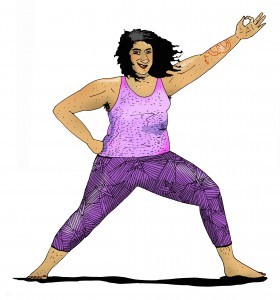One of our regulars shares a particular moment; when she realised the dimension of yoga beyond asana (movement and set poses). We share her personal story because this is one of the hardest myths about yoga to dismantle in the West.
“There are 8 limbs to Yoga, you know” the Yoga teacher kindly reminded me at the end of the lesson.

I had just waited for everyone to leave at the end of the class. I approached her with my concern that the movement I can muster now can hardly be called yoga – in my mind. The doctor diagnosed degenerative osteoarthritis at the left hip. After a decade from that diagnosis, I can’t sit crossed legged, or hold a Warrior I pose, or Crescent Moon pose, the list goes on.
But the Yoga teacher was having none of it. She went on to say that, contrary to Western trends, yoga has at its heart the intention of liberating us from pain and restriction. Our practice is meant to deliver us to a place where we can meditate freely and deeply.
“There is pranayama, for example, becoming conscious of breath”.
She wasn’t suggesting even for a minute that I would not do asana practice any longer. She was helping me into taking ownership of where I can guide my own practice towards. I was clearer on what aspects I can focus on, where I can find challenges and limitations I can learn from.
Yoga goes beyond asana as we understand it. Maybe that is closer to my experience now. Yoga for me is a field where I can find what works for me, right now in the modern world, with my unique needs and requirements.
I have been practising yoga at English Yoga Berlin in Kreuzberg since April 2018. I now understand the importance of focusing on directing the breath and becoming conscious of spinal movement. It’s clear to me that yoga is not about trying to reproduce the asana’s picture in your favourite yoga book. Yoga can be so much more! And I look forward to diving deeper to learn more about what that is.
English Yoga Berlin offers classes in Kreuzberg in Hatha style and Vinyasa style, private yoga sessions, different packages of yoga for the workplace – contact us with your queries if you have any, happy unfolding whatever you do.










